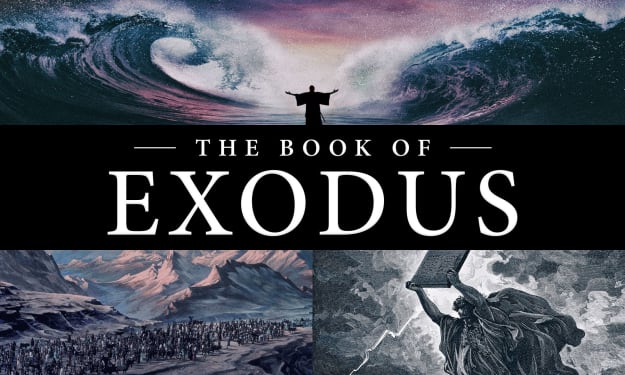The Book of Exodus Chapter 5
Exodus 5: Moses and Aaron before Pharaoh:

Exodus 5: Moses and Aaron before Pharaoh:
In the opulent heart of Egypt, within the resplendent walls of Pharaoh's palace, the stage was set for an encounter that would echo through the annals of history. Exodus 5 presents a moment of profound significance—the moment when Moses and Aaron, bearing the divine message of liberation, stood before the mighty Pharaoh, the ruler of Egypt.
As Moses and Aaron entered the grandeur of Pharaoh's court, they were met with the austere splendor of Egyptian power. The throne room, adorned with gilded pillars and intricate hieroglyphs, exuded an air of majesty and dominance. Pharaoh, seated upon his throne, was a figure of imposing authority, his regal attire a testament to his exalted status.
Yet, Moses and Aaron, though unadorned by the trappings of wealth and nobility, carried with them a power that transcended worldly opulence. They bore the divine message of the God of Israel—a message that demanded the release of the Israelite slaves and the recognition of their inherent dignity and worth.
With unwavering resolve, Moses and Aaron approached Pharaoh and delivered the message that would set in motion one of the most iconic narratives of liberation in history: "Thus says the Lord, the God of Israel, 'Let my people go, so that they may celebrate a festival to me in the wilderness.'"
Pharaoh, his countenance a mask of indifference, responded with a question that carried the weight of defiance: "Who is the Lord, that I should heed him and let Israel go? I do not know the Lord, and I will not let Israel go."
It was a moment of reckoning—a clash of wills and authority. Pharaoh, who regarded himself as a god on earth, could not fathom submitting to the God of Israel, a deity he did not recognize. His heart remained hardened, and he perceived the Israelites as valuable labor for the construction of his grand monuments.
Pharaoh's response to Moses and Aaron's request was swift and harsh. He intensified the oppression of the Israelite slaves, demanding that they produce the same quota of bricks without being supplied with the necessary straw. The Israelites, already laboring under the weight of bondage, now faced increased suffering and cruelty.
Moses and Aaron's mission had not yielded the immediate results they had hoped for. Instead, it had unleashed a furious backlash from Pharaoh, who saw their demands as a challenge to his authority. The Israelites, in turn, were disheartened and embittered by the worsening conditions of their enslavement.
Moses, burdened by the weight of his mission and the suffering of his people, turned to the Lord in anguish. He questioned God, asking why He had sent him to confront Pharaoh if the outcome had only been greater suffering for the Israelites. In his despair, Moses wondered if his mission had been in vain.
God, in response, reassured Moses of His unwavering commitment to the liberation of the Israelites. He reminded Moses that He had heard the cries of His people and had witnessed their affliction. He affirmed His covenant with the Israelites, a covenant that would bring them out of Egypt and into the Promised Land.
Exodus 5 captures the initial clash between the divine mandate for liberation and the obstinacy of earthly power. It foreshadows the epic struggle that would unfold—the struggle between the will of God and the pride of Pharaoh. The stage was set for a series of ten devastating plagues that would serve as a demonstration of God's authority and His determination to secure the release of His people.
Moses and Aaron, as humble emissaries of the divine, stood as a testament to the transformative power of faith and obedience. Their mission, though fraught with challenges and setbacks, would ultimately lead to the Exodus of the Israelites from Egypt—a journey of liberation, faith, and the enduring belief that, even in the face of tyranny, the cry for freedom and justice would prevail.
As they left the opulent palace of Pharaoh, Moses and Aaron carried with them the knowledge that their mission was far from over. The struggle for liberation had only just begun, and the road ahead would be marked by miracles, trials, and the unwavering faith of a people determined to reclaim their freedom.
About the Creator
Raymark Marcos
A Writer and Guitarist
A son of God
A student who's doing a lot of side hustles to earn enough money to be able to go for college.






Comments
There are no comments for this story
Be the first to respond and start the conversation.